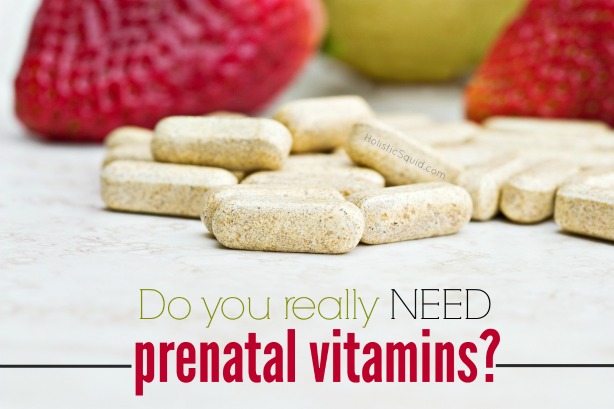
Ladies and gentleman, boys and girls, prepare yourself to witness an amazing alternative to prenatal vitamins….. Drumroll please…
May I present you with:
Good, old-fashioned FOOD!
Crazy, I know, but IF you eat the right quantity of the right foods, you don't need to waste your money on prenatal vitamins.**
Cultures around the world and through time have had sacred foods that they fed to couples trying to conceive and to pregnant and breastfeeding mothers to ensure healthy pregnancies and thriving babies. In our modern western world, women are sent to the pharmacy with a prescription for a synthetic supplement that is difficult for the body to digest and absorb.
Eating real, nutrient dense food is the best way for your body (and your baby) to get the vitamins and minerals needed for optimal health. It is best to adopt this way of eating AT LEAST three months prior to conception and to continue through pregnancy and while nursing your child. With this said, if you are already pregnant or nursing, eating right is still a must (though you will probably want to continue supplementation with high quality food-based prenatal vitamins.
The Weston A. Price foundation recommends a diet high in good quality saturated fats from pasture-raised animal sources, wild caught seafood, and other nutrient dense, properly prepared foods as follows:
| Fertility Foods | Essential Nutrients | Recommended Servings | Sources |
|---|---|---|---|
| Full Fat Dairy | Saturated fat Cholesterol Vitamin K2 Vitamin A | One quart of whole, raw milk daily plus an additional four tablespoons butter from grass-fed cows | From Pasture-Raised cows, preferably NOT pasteurized or homogenized, but at minimum: organic and full fat. Whole milk, Cream, Yogurt, Kefir, Buttermilk, Sour cream, Creme fraiche, Ice cream |
| Eggs | Saturated fat Cholesterol Omega-3 fatty acids Vitamin A Vitamin E Choline | At least 2 per day plus extra yolks | Eggs from pasture-raised hens are ideal. If not available, always choose free-range organic eggs. |
| Seafood | Saturated fat Cholesterol Omega-3 fatty acids Vitamin D Vitamin B12 Trace minerals (Zinc Copper Selenium Iron) - in shellfish | 2-4 times per week + Fermented Cod liver oil to supply 20,000 IU vitamin A and 2,000 IU vitamin D. | Oily Fish: Salmon, sardines, herring, anchovies, trout Fish roe Shellfish: Clams, oysters, mussels. Raw from reliable sources or cooked. Lobster, crab, prawns (especially when consumed whole). Fermented Cod liver oil |
| Liver | Saturated fat Cholesterol Vitamin A Omega-3 fatty acids Folate Vitamin B12 Pantothenic acid Riboflavin Niacin | 3-4 ounces 1-2 times per week + Fermented Cod liver oil to supply 20,000 IU vitamin A and 2,000 IU vitamin D. | Liver from healthy pasture-raised animals Fermented cod liver oil |
| Bone Broth | Calcium Magnesium Phosphorus Gelatin Glucosamine Chondroitin Silicon Sulphur trace minerals | [At least 1 cup per day] | Homemade from poultry, beef, lamb, or fish bones. Include feet, joints, and the heads of chicken and fish if they are available. Store bought stock is not an acceptable substitute. |
It is also recommended to consume:
Fresh beef or lamb daily, always with the fat; oily fish or lard daily, for vitamin D; 2 tablespoons coconut oil daily, used in cooking or smoothies, etc.; lacto-fermented condiments and beverages daily; soaked whole grains; fresh vegetables and fruits.
This approach may seem scary and even unsafe to many women who are accustomed to our “health by pill” culture, but consider that these Recommended Daily Allowances of nutrients are based on what is an ideal human diet. Logically, then, we should be able to get these nutrients from food. Here are the nutritional recommendations outlined by WebMD (in the first 3 columns), and the equivalent Real Food suggested servings (in the last column).
| Nutrient | Benefits | Pregnancy RDA | Real Food Sources |
|---|---|---|---|
| Calcium | Builds strong, dense bones in mother and child; may help prevent high blood pressure in pregnant women. | 1,000 mg - Don't exceed 2,500 mg. | 1 cup plain full-fat yogurt (415 mg); 1 cup whole milk (about 300 mg); 1 ounce cheddar cheese (204 mg). |
| Choline | Helps prevent neural tube defects and enhances brain development. | 450 mg Don't exceed 3,500 mg. | 1 egg (272 mg); 3 ounces of the following: pork tenderloin (103 mg), ground beef (83 mg), salmon (65 mg), chicken (65 mg). |
| DHA | Boosts baby's brain development and vision. Improves sperm and egg quality. Reduces inflammation in all cells of the body. | 300 mg | 3 ounces oily fish (740 mg), fermented cod liver oil |
| Folic Acid | Helps protect against neural tube defects during the first 30 days of pregnancy and possibly cleft palate; reduces anemia in mom and helps prevent early miscarriage and premature delivery. | 600 micrograms | No Real Food contains folic acid - it is synthetic only. Instead consume liver a few times a week for Folate. Raw spinach contains 1/3 of the amount of folate as liver per serving. |
| Iron | As part of red blood cells, iron ferries oxygen, wards off anemia in mom, and helps prevent premature delivery. | 27 mg Don't exceed 45 mg. | 3 ounces clams, oysters, or mussels (12 mg), 3 ounces of the following: beef (3 mg); lamb (2 mg); chicken (1 mg) |
| Vitamin B6 | Assists in the production of protein for new cells; bolsters the immune system; and participates in red blood cell formation. | 1.9 mg | 1 cup chickpeas (1.1 mg), 3.5 ounces beef liver (1mg), 3 ounces tuna (0.9mg) |
| Vitamin B12 | Assists in red blood cell production and helps the body use fat and carbohydrates for energy. | 2.6 micrograms | 3 ounces of the following: clams, mussels, or oysters (42 micrograms), salmon (5 micrograms), rainbow trout (4 micrograms); tuna (3 micrograms), beef (2 micrograms). |
| Vitamin D | Promotes calcium absorption from food and its deposition into mom's and baby's bones and teeth. | 4000 IU* | 1 t. fermented cod liver oil (1950 IU), lard from pastured pigs, oysters (270 IU for about 6), fish roe (up to 17,000IU per tablespoon)** |
| Zinc | Critical for cell growth and repair; energy production; and brain development. | 11 mg Don't exceed 40 mg. | 3 ounces of the following: oysters (76mg), beef (9 mg); crab (5 mg), pork (4 mg), 1 cup full fat yogurt (2 mg) |
**http://www.westonaprice.org/childrens-health/sacred-foods-for-exceptionally-healthy-babies-and-parents-too
The two main macro-nutrients missing from this table above are saturated fat and cholesterol (from animal sources) which allow for the proper absorption and assimilation of vitamins and minerals and are essential for nearly every function in the body.
If you are consuming adequate saturated fat, it is likely that you are also eating enough high quality protein (as nearly all saturated fats – with the exception of coconut and palm oils – are in meat, fish, eggs, and dairy). It is also important to note that many of the vitamins and minerals we commonly think we can get from vegetable sources (Vitamin A in carrots, zinc in grains, and fortified soy milk for vitamin D for examples) are only available in usable form from animal sources (vitamin A in liver, zinc in oysters, and vitamin D from cod liver oil and pastured lard).
Also missing from this chart is Vitamin A, due to it's alleged toxicity. According the Sally Fallon Morell, “Vitamin A is the concert master for a growing fetus.” Sounds like something worth getting right, no? So the short explanation is excess Vitamin A is only an issue with relatively insufficient Vitamin D. You can read more than you ever wanted to know about Vitamin A here.
In summary, it is completely possible to receive adequate, excellent nutrition through a nutrient-dense diet rich in saturated fat and cholesterol. If a woman is unwilling or unable to eat this way, the next best option is to take a food-based prenatal vitamin and eat a diet rich in high quality saturated fat and cholesterol. Synthetic vitamins alone are not an insurance plan for healthy conception, pregnancy, birth, or baby.
This alternative food pyramid by Sandrine Hahn of Nourishing Our Children is a wonderful visual of what a truly healthy diet should be:
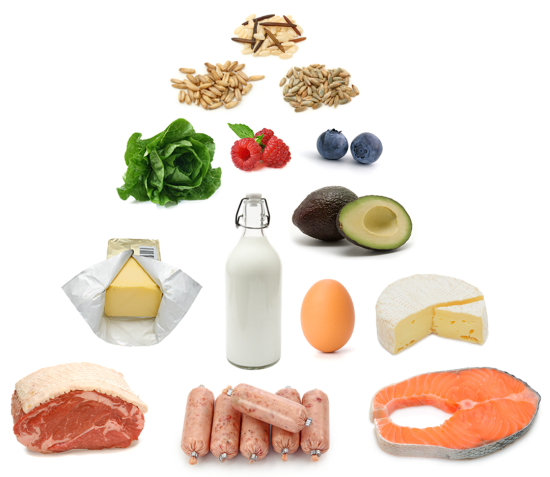
For more specific information about proper nutrition for fertility, pregnancy and nursing, I love these two informative posts by Jenny of Nourished Kitchen, which outline the essential foods for optimizing fertility, having a healthy pregnancy, growing a healthy baby: Fertility Foods and Unexplained Infertility. Kristen of Food Renegade also offers an extremely informative e-course called Beautiful Babies – not to be missed by anyone planning to conceive or already pregnant.
**Regardless of how you choose to eat or supplement, it is important to consult with a qualified health practitioner to be sure you are receiving the proper nutrition before, during, and after pregnancy.
Would you rely on nutrient-dense real food as an alternative to prenatal vitamins…or have you already done so?



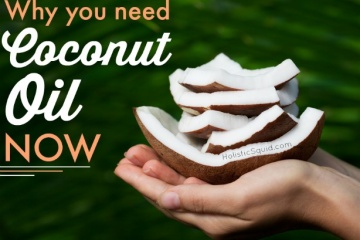
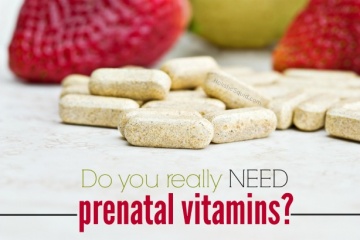


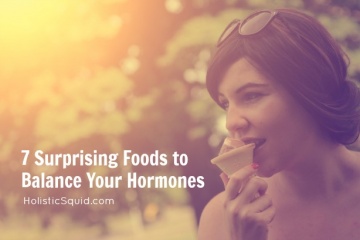
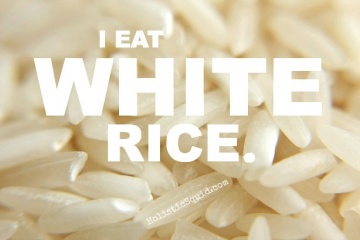
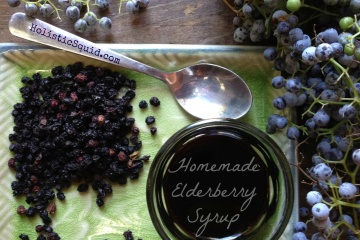
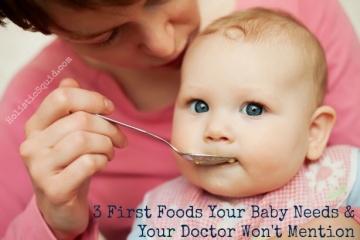
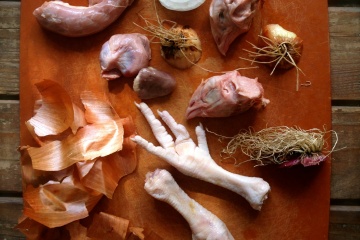
I am curious about the food pyramid because by the time you get done with coconut oil, full fat fish meat etc and milk you are hardly hungry for your fruits and veggies! A quart of milk seems like a lot for trying to eat all the other things…..
Is there anything in particular that really helps stabilize blood sugar? Coconut oil makes me feel sick even in small quantities.
Thank you,
Mary
Hi Mary – Yes, the food pyramid in the post (done by Sandrine Hahn of Nourishing Our Children) reflects the Weston Price Foundation’s recommendations which have fruits and veggies as secondary in importance to full fat milk, fish, meats, etc. In my opinion, this reflects the amount caloric representation more than actual amounts. For example, you can eat a big green salad with your 2 eggs fried in butter and few strips of bacon, and that would still be representative of this pyramid. Alternatively, you make have a meaty stew with a small side of cultured sauerkraut. This would also fit.
As for stabilizing blood sugar, in my personal experience, I have been able to stabilize mine by cutting WAY back on grains and sugars (including drastically reducing fruit). This may not be the best plan for everyone, but it definitely works for me.
Regarding Sources for Bone Broth–pork bones make excellent broth too, both in terms of nutrition and taste. We make our broth exclusively from it and it’s great. It’s a bit stronger than chicken stock, but not as heavy as beef.
Good to know, Josefina. I haven’t made pork broth, but it sounds delicious!
i love this post. sadly, i have a milk allergy. any other suggestions? also, i am still concerned about consuming raw milk during pregnancy.
Keller – If you can’t eat dairy (have you tried milk kefir?) just be sure to eat plenty the other foods on the list. Bone broth and clam, mussels and oysters are a great source of minerals.
My husband and I are trying to conceive and I have been warned by many moms that raw unpasturized milk and cheese made of it is not good for the fetus. Is this just another myth or does it really have the infamous bacteria that is harmful to the fetus?
Thank you,
Aliona
Hi Aliona,
In my non-professional opinion, I believe it’s a myth. While you may want to avoid soft cheeses, raw milk and raw hard cheeses are perfectly healthy, especially if you can get aged cheddar, and remember that grass fed is always best!!! Try to find a local source of raw milk that you can trust. Many local dairy’s will let you tour their facilities if you want to make sure it’s clean and handled properly. I’m 4 mo. pregnant right now and have drank as much raw milk as possible the entire time and all is well. It’s actually a great pick me up if I get tired during the day at work. 🙂 I’ve had NO morning sickness and believe it’s all due to a Weston A. Price diet.
Congrats on your pre-conception journey and have fun preparing to welcome a new special soul into your life!!
i am able to eat a lot of butter, just no milk.
How true! We don’t eat multi vitamins in our house. I find this an interesting topic because many people who are very concerned about their food and health and lifestyle are very pro vitamins, which are controlled by huge billion dollar companies. If you eat right, you will get your vitamins from your food, which is the best way to get them. There are some studies that show that if you take vitamins, your body won’t absorb them from your food, which is a better source of vitamins. Thanks for bringing it up.
good article, but doesn’t help the vegitarians much 🙁
Caitlin – Sorry, not really. Unfortunately a vegetarian diet is not ideal during pregnancy. If you do choose to eat vegetarian while pregnant, be sure to eat plenty of eggs (including the yolks), butter, raw milk, and other full fat dairy. If you are open to it, fermented cod liver oil provides so many important nutrients for you and your growing baby. Supplement with a high quality food based prenatal (mentioned in the post above), with extra b vitamins and vitamin D if your levels are not between 60-90ng/ml.
This may shed some light on vegetarian and vegan pregnacies. Despite what some people say, it is completely possible and easy to have a healthy pregnancy while being vegetarian or vegan. The Farm is a prime example of this. They have been having healthy vegan pregnancies for decades. It was also here that many of our birthing practices originated for natural births.
http://www.vrg.org/nutrition/veganpregnancy.php
Based on my own research and experience, I think this varies by person, and also by how long one has been on a vegetarian/vegan diet. I would like to see a study of long term effects of vegan diet. I have known some very unhealthy vegetarians and vegans. I have also been a vegetarian for four and a half years myself (no longer). For some reason, I have trouble gaining enough weight in pregnancy, and I would never have been able to do it on a vegetarian diet. I know my body really needs that protein and fat. The other forms of protein are good, but not the same.
My question, though, is – if someone has to be taking a manmade supplement (B12) to maintain pregnancy on a vegan diet, can it possibly be ideal? The need to take a supplement because an essential substance is completely missing from the diet seems to me like a fairly large signal that something is not right…
Easier said than done when you’re nauseaous, vomiting, and having strong food aversions. At least I ate this way before pregnancy…
Lori – I feel your pain (having had 2 pregnancies with morning sickness myself). Good for you for eating this way before your pregnancy. It will go a long way to ensuring health for you and your baby! May your nausea subside soon!
Thanks for the post! I like your site. I am visiting from Kelly the Kitchen Kop today….So happy to find the nutrients listed on broth! I had been curious about that, and had felt like I scoured the internet to find it to no avail…and here it is!
Thanks, Andrea! Happy to help. 🙂
Hi, enjoy your post. I’m new to all this REAL FOOD nutrition and way of living. I really want to improve my nutrition for myself and my 16 month old and now especially since i’m pregnant with 2nd child. We’re not horrible eaters but could do much better.
However, I’m still confused and concerned about the Vitamin A during pregnancy and causing birth defects since I’m only 5 weeks pregnant. Although, I’ve read various and conflicting information. I want to start taking a blend of fermented cod liver oil/butter oil and not sure if I should take that AND continue taking my prenatal vitamins. Will that be too much Vitamin A? I understand or think that it’s different Vita A(prenatal Vitamin A is synthetic, and cod liver Vitamin A is natural). So should I be with taking too much Vitamin A if I take BOTH prenatal vitamins and cod liver oil?
Thank you in advance for your advice!
Prior to getting pregnant, I had been avoiding my usual glasses of raw milk because I was worried about insulin resistance. (I am overweight and I had been diagnosed as insulin resistant prior to my real food lifestyle change–though I’m nowhere near as insulin resistant or overweight now as i was then.) Instead, I was eating plenty of raw milk cheese, strained raw milk yogurt, and other lower carbohydrate, full-fat, homemade raw milk products. I was borderline GD in my last pregnancy and want to be very careful about blood sugar/insulin levels in this one. So, my question is, can I get the benefits of that quart of raw milk by consuming other, less carbohydrate loaded, raw dairy? (I already do not eat grain or sugar, and limit my intake of starchy veggies from my garden.) (And, as a P.S. by borderline GD, I mean that I barely tested positive in the three hour test, and my current OB says they messed up the test and I was never GD. I never had a high blood sugar–but was VERY careful about my diet and sugar checks–and never needed insulin.) Otherwise, my diet already looks pretty much like what you’ve outlined–which made me feel A LOT better, because this is a SURPRISE pregnancy after over a decade of infertility and belief that we could not get pregnant naturally.
More than 10,000 iu’s of Vitamin A per day seem to increase birth defects. http://www.nejm.org/doi/full/10.1056/NEJM199511233332101
Hi Gibran – The issues is actually with too much vitamin A out of ratio from Vitamin D. If you are getting your nutrition through food, then this is not an issue. Supplementing with fermented cod liver oil is also fine, as no synthetic vitamins have been added to it, and the D and A are in proper ration.
I did not take a multi with either of my pregnancies. No folic acid, either. Just lots of liver, CLO, eggs, coconut oil, quality grass-fed meat, etc. The hardest part was answering my midwife when she would ask me each month if I was taking my prenatal vitamins. Of course, I just answered, “Yep!” (since I was technically taking them, just not in the form she was probably thinking of!).
I was vegan for about 4 years and then a vegan raw foodist for a few months. However, it caused me to become underweight and have a vitamin D and B12 deficiency, I was starting to feel weak and have digestive and joint issues…my joints would literally pop when i woke up or stretched, so I had to start eating small amounts of fish and then organic chicken and free range eggs and lots butter and I eventually started to gain weight and get better after suffering while my body was adjusting to animal foods again. It was a gradual process but I stuck to my regimen. Now, I am well again and including plenty of grassfed meat and raw milk into my diet whenever possible. Unfortunately my local organic farmer who sells raw milk products only delivers once a month so I only have limited access to raw milk. I love your post by the way!
Hi Naaveila – Thanks for sharing your story here. It so important for vegans to know about the risks involved with that way of eating, and I find this usually is most effective coming from former vegans. I am so glad to hear you’re doing well now! 🙂
I have been vegan for several years and never experienced your problems. In fact, since becoming vegan I am healthier and happier. I have no vitamin/mineral deficiencies and am a healthy body weight, full of energy, and all around extremely healthy. Being vegan takes more work than just eating whatever is put in front of you. I do not take a multi vitamin; I eat a variety of foods everyday and have no problems meeting my reccomended daily values. It is apparent you were not adequately planning meals and making sure you were reaching the recommended values. I find this happens a lot in inexperienced vegans/vegetarians or lazy ones. It takes work, but it is worth it in the end. Please don’t take this as an attack because that is not at all what I am saying. I am just letting others know that a vegan diet is adeqaute and healthy when you take the proper time to plan meals. After a while, you just know. My body tells me when I need something and I listen. I rarely have to plan or think about meals. I just naturally eat what I need.
Do you recommend any alternatives to raw milk?
I have a fantastic source for raw dairy, and can consume cheese, yoghurt, butter, etc., but milk makes my skin break out in ways I can’t even explain. Dairy in the form of milk is just not possible for me.
Hi Maddy – Have you tried raw dairy? It often acts completely different in the body than the pasteurized milk products. If dairy is still a no-go, just be sure to really focus on the other nutrient-dense foods and get plenty of sun for your vitamin D.
Hi. I agree with the nutrition recommendations, and ate this way through half of most of my first pregnancy (according to the Bradley Method), and continued through my second. I do have a question: what if you can afford to eat a lot of high nutrient density foods? Is it better to non-organic forms to consume more, or eat the raw, organic, grass fed, higher quality options, but only sparingly? I feel so much guilty when I read about the importance of nutrition, but simply cannot trim the budget any further in order to buy top quality. I’ve read many an article on how to budget and afford more. Some people are just limited. What to do…
Hi Megan – Great question! Personally I think it depends on the specifics. For example, if you can’t afford raw milk, I would opt for pasteurized milk but insist it’s from grassfed cows. Same goes for yogurt and butter from grassfed cows.
Eggs and bone broth can be relatively affordable so I’d include plenty of those.
After that, I would prioritize liver followed by seafood like clams, oysters and mussels. I would occasionally splurge on inexpensive fish roe.
Meat and poultry can then be in moderation because you are hitting all the nutrient-dense superfoods.
Hope this helps! 🙂
This post is very helpful and encouraging. I’m so grateful I stumbled upon your blog!
I am completely on board with nourishing foods over processed and full fat foods over prenatal vitamins as much as possible. But as my husband and I barely scrape by month to month on what we make do you have any advice for how to prepare your body for pregnancy and continue to maintain healthy eating while breastfeeding on a budget? We eat as nutritionally as possible, as locally and as organically as possible. We don’t eat any processed foods, or oils. But looking at your list of “40 foods for fertility”, How do I not break the bank? What are the must haves etc.?
Thank you, Thank you,
Jacqueline
Emily,
Quick question. Do you know much in regards to MTHFR and the nutrient deficiencies that come with it? I recently found out I am compound heterozygous and have had a ton of vitamins thrown my way….b12 shots, very pricey prenatals with methylfolate in them etc etc. I am a true believer in the Weston A. Price foundation, but am stumped about whether to keep up all these vitamins or just go back to focusing solely on nutrition. I have added in foods like liver and bone broth and I really think that has helped.
Hi Becca – I am not an expert on MTHFR and I would suggest seeking out a good holistic practitioner who is. In the meantime, this post from a fellow blogger is very informative – just bear with the dense blocks of tiny text!
http://www.lovingourguts.com/mthfr-part-2-2/
Wishing you the best!
My husband and I are wanting to start a family this year and we’ve begun making changes to our already super clean diet in preparation. I am getting slightly concerned in that many of these foods I’m seeing recommended so much I have bad inflammatory reactions to (dairy, egg yolks, poultry, and red meats). I can’t help but feel if it’s bad for my particular body, that won’t be doing my baby any good either. Do you feel that I could procure equal amounts of nutrients from a plan, broth, and fish based diet?
*plant
Hi Devyn – Every individual is different, and if dairy, egg yolks, poultry, and red meats don’t work for you, it’s not intention to guilt you into eating them. Follow what feels best for your body, and do your best to get plenty of fish, non-heat treated cod liver oil, clarified butter – if you can tolerate it – and fish bone broth. If I were you, I would also be sure to take a good food-based prenatal vitamin to make up for any missing nutrients.
I will do that! Thank you so much for your reply. 🙂
It’s a pleasure! Let me know how it all works out for you 🙂
Hey, what happened to the recommended food tables on this post? They were really helpful! I referenced the often and I think they recently disappeared from the post.
Hi Alicia, thanks for your comment. The tables are still in the post. Perhaps there was just a glitch. Let me know if you still can’t view them. Thanks!
They are back. Thank you!
Hi
My husband and I have been ttc for three years. I am 39. He is 41. According to fertility tests things look good. I have a very clean organic non processed diet…..and continue to add more of the wapf recommendations…..liver…shellfish being the hardest to add at this points. I never did well with regular dairy and always had an upset stomach as a child when I was forced to drink it. I avoided milk and yogurt for most of my teens and twenties….along with all fat…. In my very early thirties I began eating full fat yogurt and other healthy fats. Long story short….I added FClo and drinking organic
raw milk daily about 2.5 years ago. I’ve had no stomach issues at all. My ? Is as I have never been tested for a dairy allergy….I feel pretty good on it…..I keep reading in regards to infertility that dairy and gluten are good to eliminate. I’ve been gluten free. That’s not a problem. I’m just torn re raw dairy as I know it’s so good for the body. Is there ever a time it is best for one to eliminate it when ttc? This for any insights.
Hi Taylor, thanks for your question. I would not avoid dairy (from grass fed cows). It doesn’t sound like it is your issue. At 39, fertility is waning for many women so diet-wise you should focus on eating as many foods as possible to maximize your fertility potential including full-fat dairy.
Hi Emily,
I recently saw a post by you that said you enjoyed/recommend New Chapter Prenatal Vitamins while pregnant. Would you also recommend their Women’s Mineral Complex in pregnancy? Really enjoy your site and Facebook pages–thank you for all that you do!!
This is a fabulous post, thank you so much for writing this!! I noticed that you add Creme fraiche as one of the foods to eat. Yay! I make all my own cheese from my own goat milk and I’ve always considered that a soft cheese. Would you consider other soft cheeses, especially when made in your own home, to be OK for pregnancy?
I also see a lot about cows milk in relation to real food but not much about goat milk. I’m curious what a “real foodist” would say on cow vs. goat milk?
Thanks!!! Love your site!
Great post!! Thanks for taking the time to do these very helpful charts. It seems like it would be hard to meet the iron requirement, even with the traditional foods listed. I wonder if there’s a good iron supplement you would recommend?
I have been trying to follow the WAPF guideline for pregnant women but am finding that it is way too much food. (I am trying to conceive). Do you have any suggestions on how to fit all this food into a normal diet? I find that eating higher fat foods fills me up and keeps me full longer, so I am not hungry.
I am 5 weeks pregnant and have been taking Garden of Life RAW whole food based prenatal vitamins and 2 teaspoons of unprocessed Cod Liver Oil daily for over a year now. This week I have started taking 2-3 frozen “Pills” of liver a day. Is this overdoing it in Vitamin A??
Hello,
My husband and I are likely going to try and start getting pregnant in a few months, so i want to start following this more strictly over the coming months. I just cannot stomach liver though. I bought a bunch last year determined to make myself like it; but then following a lovely nutrient dense meatloaf, I got some sort of bug and it came back up. Ever since, the smell, taste, thought of it make me gag. I know it’s really important to follow ALL the WAPF guidelines, and not just pick and choose – b/c they all work together and balance one another out. Would not eating liver, but following the rest of the guidelines be okay? Is there anything I can eat in place of liver that would provide similar nutrients? (I’m already taking FCLO) Or shoud I take a prenatal vitamin? Thanks!
Soak the liver in milk overnight. Slice thin (like 5mm), bread it and fry it in bacon grease. Only do 1-15 seconds each side in the hot grease. Eat dipped in ketchup or a sauce of your choice. I used to be a total liver hater until the other night when I made it like this. The milk makes a huge huge difference in the flavor.
This is awesome.. 🙂 bookmarking now
Hi, I came across this page on the search for an alternative to the frolic a I’d tablet as I’d rather have this intake the natural way, I have read that spinach and chickpeas and orange juice have the highest frolic acid count but you have stated that only spinach contains it… I was hoping to make. Smoothie that I could take daily as a substitute any suggestion.
Thank you
Emily – My husband pheasant hunts and we always have the whole bird — would that be a good option for the bone broth? Would it even taste good? –Thanks!!
Hi Jenna – I’ve never had pheasant broth but I would imagine it would be great 🙂
What happened to the chart? I wanted to refer a friend to it.
Hi Emily, I have been following a gluten-free version of WAPF diet for a couple of years now to naturally manage Hashimoto’s (with great success). Is there anything special I should do during pregnancy to kick this up a notch? I can’t have anything gluten-y or cross-reactive…I also never eat goitrogenic foods raw, to support my sensitive thyroid. I’m going to be visiting a naturopath soon, but am interested also in your thoughts.
Hi Kate, without knowing more about your case, I would say that if a gluten free real food diet is working for you now, continue to do so. Your naturopath will be able to recommend any further additions you may need based on you medical history.
Thanks for this post! I’m looking into the “mykind organics” prenatal vitamin by Garden of Life.
Seems like a good thing. Entirely whole, organic foods reduced to a pill form. Nothing artificial about it. Though I’d like to have the ideal diet while pregnant, I know I’m sometimes in too much of a time crunch to plan out better meals. I mostly have the diet stated above, but just in case am thinking of adding these vitamins to my diet.
Anyone heard of these, and have any opinions? Thanks!
Hi Emily! Are you familiar with Garden of Life’s Vitamin Code Raw prenatal?If so, can you please tell me if there is any difference between Garden of Life’s Vitamin Code Raw prenatal versus their MyKind Organic prenatal? Is there any reason you might prefer one over the other?
Hello,
I am a real food newbie and I am nursing my 8 month old son. I take Lifetime’s Professional Prenatal Formula and have been looking into taking the FCLO/Butter Oil blend. What kind of healthcare professional should I be seeing to get help with diet and supplements, a nutritionist? I know nothing about nutritionists, should I look for a specific kind of certification?
Thanks,
Kate
I have read widely differing values for levels of vitamin A and D in food sources. Eating liver – high in vitamin a once a week , how would u be sure to get enough vit D especially if not having raw milk products. Just wonder exactly how this diet gets 5:1 ratio recommended on WAPF to avoid defects.
Secondly, I assume folate is water soluble and wouldn’t be stored from once a week liver so I’m still nervous about how to be sure on this one?
Hey Shona,
Egg yolks and wild salmon are a great source of vitamin D. Wild salmon has four times more vitamin D than farmed, so this matters! You can also find vitamin D in lard – again, source it from happy pigs raised on pasture.
The concern around folate is with folic acid, often found in prenatal supplements. Folate is found in food and folic acid is synthetic.
Hope this helps!
Emily xoxo